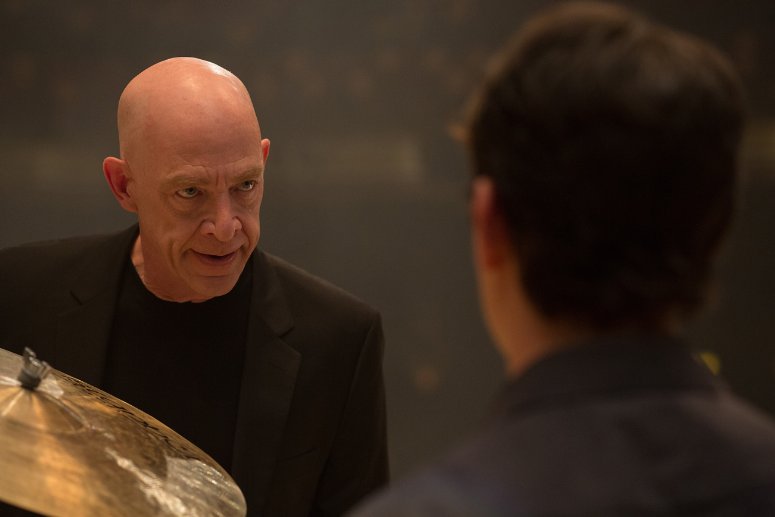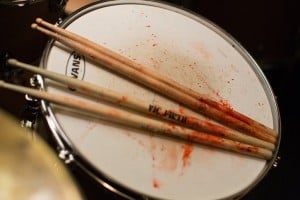
The Academy Award-nominated film Whiplash is named after a famous jazz song by Buddy Rich. The film opens by introducing us to conservatory music student Andrew Niemann (Miles Teller). Andrew is a social outsider, even within his own family. He is drawn, like Icarus, to higher glory than mere mortals. He believes he is better than other people and longs for artistic validation. He doesn’t care about the party crowd in college; he doesn’t find identity and affirmation even in his grace-giving, loving father (Paul Reiser). The only thing that ultimately matters to him is achieving musical greatness as a jazz drummer and experiencing the affirmation of his emotionally and physically-abusive but musically-accomplished teacher, Terence Fletcher (J.K. Simmons). Nothing.else.matters.
Fletcher is a ferocious coil of controlled energy, a calculating manipulator of emotions, justifying his aggressive behaviors with the belief that fear gets people to perform at a higher level. Like the Simon Cowell of musical conservatories, he controls his jazz players with shame and humiliation. He insists on nothing less than perfection, sometimes making his players repeat a single line of music over and over and over–even up to hours–until they get virtually unnoticeable errors removed. He throws a chair at one musician. He humiliates publicly. He takes cursing and insults to a new level of creative abuse.
Weirdly, Fletcher’s musically-accomplished students rarely stand up to him. In thrall to his power–psychologically and career-wise–they submit to countless indignities, only to come back for more. Those who fall outside the realm of his acceptance and approval, land in despair and hopelessness, especially in one notable case. To be without his favor is death itself. Not only that, but the toxic mix of rage and perfectionism that Fletcher imposes on his students gets handed down to those who are more lowly than they. There is no grace here. There is only achievement. There is only exaltation when, survival-of-the-fittest style, a student tramples another underfoot.
The idea that a musical prodigy like Fletcher sees something in Andrew gives him a tremendous boost of confidence, but when that approval is easily taken away, he finds that he has become addicted to it.

Slowly, Andrew’s longing for musical immortality grows into an obsession that takes over his entire life, pushing out relationships and any sense of healthy balance. He is driven by a slave-driver of perfectionism deep within. A slave-driver that says he is without value unless he achieves perfection. A slave-driver that leads him to play the drums again and again until they are streaked with his blood and sweat. A slave-driver that sees other people as valueless unless they are a means to his end of becoming musical legend. A slave-driver that takes him out of touch with reality (particularly after one shocking turn near the end of the film).
Andrew’s strange detachment from reality and perspective and his frantic pursuit of perfection powerfully parallel another film, this one about the obsessive pursuit of perfection in ballet. I speak, of course, of Darren Aronofsky’s Black Swan. Black Swan also has an emotionally-manipulative teacher/director who thinks his methods draw greatness out of his performers. In the end, his star dancer dies or goes insane but definitely literally bleeds, eaten away by the cancer of perfectionism and out of touch with reality, but grasping desperately to hold to the idea that at at least she has achieved artistic greatness. Is this good? Is this bad? The closing scene of Whiplash maintains a similar tension and ambiguity, leaving it to the viewer to conclude whether or not the pursuit of artistic greatness at all cost is worth it.
(An aside: I am always appreciative of films that do not preach to me but rather leave me with through-provoking story, imagery, and ideas, leaving me to conclude what I think. I saw Whiplash the same day that I saw a much more popular film, a film that has made a lot of money and generated a lot more buzz. However, this other film was far less nuanced, far less crafted, and far more “preachy.” Thank God for artists who trust their audience enough to not tie up every loose end neatly and tell us what to conclude. In art, an image and a story is much more powerful than a sermon.)

One of the reasons I found Whiplash so thought-provoking is because I tend toward the obsessive pursuit of perfection in my own life. I have written about this previously: how becoming a Lutheran and connecting with God’s grace has helped me greatly in this area (as have, let’s face it, antidepressant medications and counseling resources). But here’s the true story: although I have the powerful resource of God’s grace, my personality is such that I still race toward perfectionism more easily than I turn to that grace.
Maybe motivation through fear draws out some great artistic performances, but I will tell you that such obsessive pursuit of perfectionism has been nothing but a toxic blend of poisonous slavery in my own life. I do believe we all need challenge to grow, and I do believe we should pursue excellence in whatever our “thing” is, but when our sense of self becomes dependent on doing things perfectly (an impossible standard), that’s when we know it’s not a healthy dynamic.
Now, some would say, “Well, it’s just religion that makes you feel that way.” And granted, some experiences of the worst side of fundamentalism can make things worse. They can function like that the ugly emotional control that Fletcher displays in the film. But to completely relegate the cause of perfectionism and disorders like anxiety and obsessive-compulsive disorder (OCD) to problems within some expressions of religion would be dishonest. Anxiety and perfectionism are hardly limited to religious and post-religious people! There are physical causes of these disorders. There are emotional and spiritual causes too.
No, there are multiple factors deep within us that conspire to eat us alive if we let them. Sometimes they do this even if we try not to let them. Our hunger for perfection and our dismay when we fail can literally kill us. We run the hamster wheel, convinced we will succeed if we just try harder next time.
If there is a gift in my own experience of perfectionism and OCD, it is that it brings me face-to-face with my desperate, aching need for grace in a way that I might be slower to recognize without it. When I hit the brick wall of my own failure, my own finite nature, I realize my need for love and acceptance that comes exclusive of my performance.
My need drives me to my knees. My need drives me to Matthew, where I read:
“Blessed are the poor in spirit,
for theirs is the kingdom of heaven.“–Matthew 5:11 NIV
THANK GOD.
It drives me to Romans, where I read:
The Spirit you received does not make you slaves, so that you live in fear again; rather, the Spirit you received brought about your adoption to sonship. And by him we cry, “Abba [literally, “Daddy”], Father.” The Spirit himself testifies with our spirit that we are God’s children.–Romans 8:15-16
In other words, God has already made believers His children, simply as we turn to Him in trust, like a little child lifting its hands up to be held. God scoops us up in His arms. He holds us there and we remain His, held not in fear and control, but held in the loving embrace of a tender Father. Held and loved like a parent continues to love their child through all that child’s mistakes, rebellion, and even disrespect. A child of God and no longer a slave.
For me as a Christian, the radical acceptance of God, the unconditional love of my heavenly Father continues to be the central principle of my life. Sometimes I revolve outward from that center, foolishly trying to venture out again in slavery to the old perfectionistic drive. But I trip, I fall flat on my face, and He so lovingly comes and scoops me up again. Thank God for His grace.
Have you struggled with perfectionism, anxiety, or OCD? What helped you? I’d love to hear any thoughts on this.
Also, have you seen the film Whiplash? Thoughts are welcome!
——————-
Community discussion guidelines:
Because this is a Christian blog, the things I’m talking about will obviously be topics that people feel strongly about in one direction or another. Please keep in mind that this is a place for substantive, respectful conversation. All perspectives are welcome to discuss here as long as all can treat each other with kindness and respect. Please ignore trolls, refuse to engage in personal attacks, and observe the comment policy listed on the right side of the page. Comments that violate these guidelines may be deleted. For those who clearly violate these policies repeatedly, my policy is to issue a warning which, if not regarded, may lead to blacklisting. This is not about censorship, but about creating a healthy, respectful environment for discussion.
P.S. Please also note that I am not a scientist, but a person with expertise in theology and the arts. While I am very interested in the relationship between science and faith, I do not believe I personally will be able to adequately address the many questions that inevitably come up related to science and religion. I encourage you to seek out the writings of theistic or Christian scientists to help with those discussions.
———————-
Photo source: IMDB.com. Photos by Daniel McFadden – © Courtesy of Sundance Institute.












